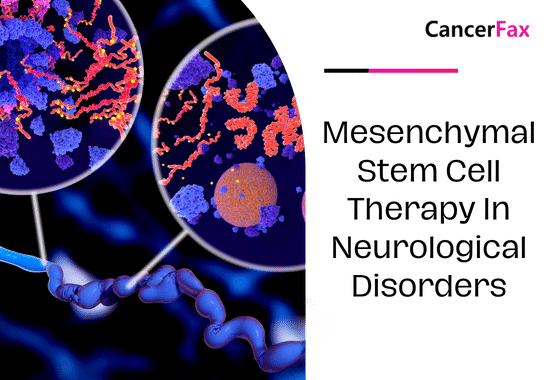Mesenchymal stem cell therapy in neurological disorders
Neurological diseases are big problems around the world because they cause a lot of death and disability. Traditional treatments haven’t always worked, which has led to a change toward new methods like cell-based therapies. Because they are multipotent and can change into different cell types, mesenchymal stem cells (MSCs) have become a good choice for allogenic cell treatment. These cells, which come from the mesoderm and ectoderm, might be able to help treat neurological diseases by changing into neuron-like cells, affecting the immune system, and encouraging neuroregeneration.
What Mesenchymal Stem Cells Are Made Of?
MSCs are non-hematopoietic cell precursors that can be found in the tissues of both growing embryos and adults. They can make copies of themselves and change into different types of cells, which makes them useful for healthcare. The word “mesenchymal” comes from the fact that they come from fetal connective tissue, which is where bones, cartilage, and muscles are made. Because they can become many different types of cells, MSCs show certain surface markers and have potential for allogenic cell therapy.
Possibility of Treatment in Neurological Disorders
Researchers have found that human umbilical cord mesenchymal stem cells (hUC-MSCs) can protect neurons and stop them from dying. They do this by releasing cytokines and neurotrophic factors that help neurons grow again. Because of these qualities, MSCs can be used to treat brain diseases like Alzheimer’s and stroke. Even though researchers are still working to improve MSC-based therapies, it is still hard to fully use their promise to treat complex neurological disorders.
In conclusion, mesenchymal stem cell therapy is a new method that shows a lot of potential in the treatment of neurological disorders. While more research is needed to solve current problems and improve treatment results, MSCs are a multifaceted approach that has a lot of potential to make the lives of people with neurological conditions better.
You may like to read: Stem cell therapy
What are the benefits of mesenchymal stem cell therapy for neurological disorders?
The study results show that mesenchymal stem cell therapy can help with a number of neurological disorders, including:
Neuroprotection and Anti-Apoptotic Effects: Mesenchymal stem cells (MSCs) help protect neurons by releasing cytokines and neurotrophic factors that encourage neuroregeneration. This could help treat conditions like Alzheimer’s disease and stroke.
Improved Recovery from Ischemic Stroke: Research has shown that MSC transplantation can help people recover faster from ischemic stroke. This shows that MSC-based therapy could be used to treat neurological conditions.
Multimodal Treatment for Nervous System Repair: In vitro and preclinical studies have shown that MSCs are useful for fixing the nervous system in a number of diseases because they have special properties.
Significant Benefits in Animal Models and Patients: Studies have shown that MSCs have significant benefits in animal models of neurological diseases and patients with neurological damage. This highlights the promise of MSC therapy to improve outcomes in neurological disorders.
In conclusion, mesenchymal stem cell therapy shows promise in protecting neurons, speeding up recovery from stroke, giving a multimodal approach to nervous system repair, and showing big benefits in both animal models and people with neurological disorders.
What are the potential side effects of mesenchymal stem cell therapy for neurological disorders?
Some possible side effects of using mesenchymal stem cells to treat neurological diseases are:
1. Immune reaction: Allogeneic MSC transplantation may cause an immune response, which could cause problems like graft-versus-host disease (GvHD) or the body rejecting the sent cells.
2. Tumor formation: Because MSCs are not divided yet, there is a small but real chance that a tumor will form.
3. Infection: Because their immune system is weakened during treatment, immunocompromised people who receive MSC therapy may be more likely to get infections.
4. Teratoma formation: Because MSCs can change into many different types of cells, there is a possible risk of teratoma formation, which is a rare type of tumor.
5. Vascular complications: MSC transplants could cause vascular complications, like thrombosis or embolism, which could cut off the area from getting blood.
6. Inflammatory reactions: MSC therapy may cause inflammatory reactions, which could make neurological complaints worse or cause new problems.
In conclusion, mesenchymal stem cell therapy has a lot of potential for treating neurological diseases, but it is important to know about the risks and side effects that could come with it. To make MSC-based therapies work better and lower these risks, more study is needed.
What are the most common neurological disorders treated with mesenchymal stem cell therapy?
These are the most common neurological conditions that mesenchymal stem cell treatment is used to treat:
1. Injuries to the Brain, Spinal Cord, and Peripheral Nerves: Stem cell therapy, which includes mesenchymal stem cells, is used to treat injuries to the brain, spinal cord, and peripheral nerves.
2. Stroke: Mesenchymal stem cell therapy has shown promise in the treatment of stroke, with the goal of helping people recover faster and have better outcomes.
3. Alzheimer’s disease: In the case of Alzheimer’s disease, research shows that mesenchymal stem cells may help treat the disease by protecting neurons and stopping cell death by releasing cytokines and beneficial factors.
4. Multiple Sclerosis (MS): Mesenchymal stem cells have been tested in clinical trials as a possible treatment for MS, and some studies have shown that they may be able to help people with this neurological disease.
To sum up, mesenchymal stem cell treatment is often used to treat a wide range of neurological conditions, such as brain, spinal cord, and peripheral nerve injuries, as well as Alzheimer’s disease, multiple sclerosis, and stroke.
You may like to read: Mesenchymal stem cells (MSC) and platelet-rich plasma (PRP) therapy in the treatment of knee osteoarthritis
Dr. Nishant Mittal is a highly accomplished researcher with over 13 years of experience in the fields of cardiovascular biology and cancer research. His career is marked by significant contributions to stem cell biology, developmental biology, and innovative research techniques.
Research Highlights
Dr. Mittal's research has focused on several key areas:
1) Cardiovascular Development and Regeneration: He studied coronary vessel development and regeneration using zebrafish models1.
2) Cancer Biology: At Dartmouth College, he developed zebrafish models for studying tumor heterogeneity and clonal evolution in pancreatic cancer.
3) Developmental Biology: His doctoral work at Keio University involved identifying and characterizing medaka fish mutants with cardiovascular defects.
4) Stem Cell Research: He investigated the effects of folic acid on mouse embryonic stem cells and worked on cryopreservation techniques for hematopoietic stem cells.
Publications and Presentations
Dr. Mittal has authored several peer-reviewed publications in reputable journals such as Scientific Reports, Cardiovascular Research, and Disease Models & Mechanisms1. He has also presented his research at numerous international conferences, including the Stanford-Weill Cornell Cardiovascular Research Symposium and the Weinstein Cardiovascular Development Conference.
In summary, Dr. Nishant Mittal is a dedicated and accomplished researcher with a strong track record in cardiovascular and cancer biology, demonstrating expertise in various model systems and a commitment to advancing scientific knowledge through innovative research approaches.
- Comments Closed
- March 6th, 2024






Clinical trials for neurological repair, Mesenchymal stem cells for brain disorders, MSC in stroke recovery, MSC therapy neurology, Multiple sclerosis stem cells, Neuroregeneration breakthroughs, Parkinson’s disease cell therapy, Stem cell treatment for neurodegeneration
Welcome to CancerFax !
Stem cell therapy in China costs around 22,000 USD, depending on the type and stage of the disease and the hospital chosen.
Please send us your medical reports, and we will get back to you with details of the treatment, hospital, and cost estimate.
Chat with Susan to know more>